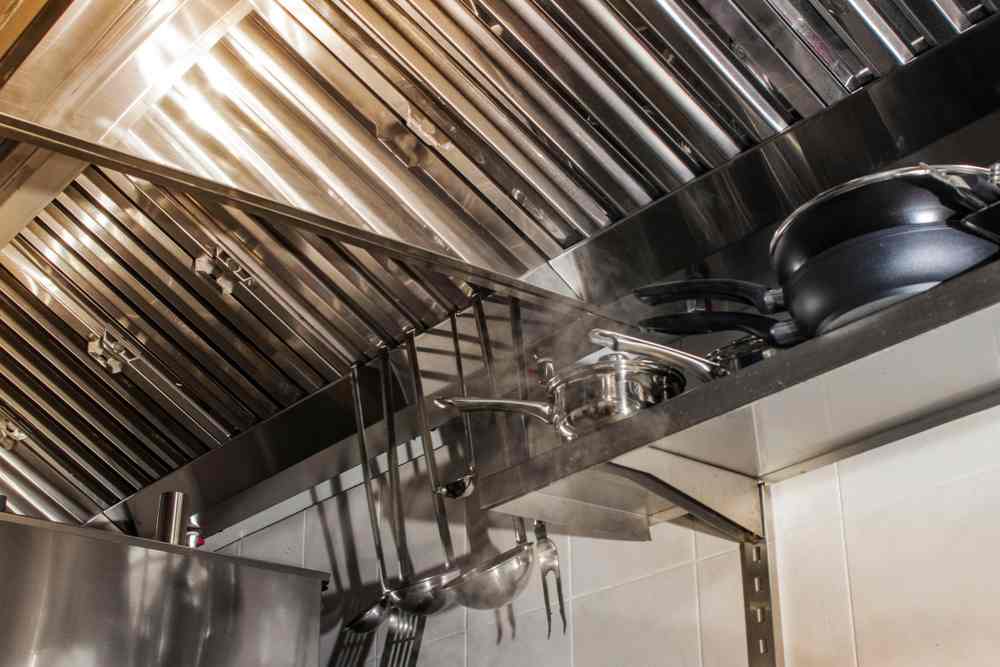How to Clean Kitchen Exhaust the Pros and Cons

Ontario-wide Kitchen Exhaust and Hood Cleaning – Best prices and service guaranteed.
Kitchen exhaust systems play a crucial role in maintaining a clean and healthy environment in our kitchens. They remove smoke, grease, and odors, ensuring that the air we breathe while cooking is safe. However, over time, these exhaust systems can become clogged with grease and other debris, reducing their efficiency and posing a fire hazard. Regular cleaning of kitchen exhausts is essential to maintain their functionality and safety. In this article, we will explore the pros and cons of cleaning kitchen exhausts and provide valuable insights on how to effectively clean them.
The Importance of Cleaning Kitchen Exhausts
Before diving into the pros and cons of cleaning kitchen exhausts, it is important to understand why regular cleaning is necessary. Here are some key reasons:
Ontario-wide Kitchen Exhaust and Hood Cleaning – Best prices and service guaranteed.
- Fire Safety: Grease buildup in kitchen exhaust systems can be highly flammable. According to the National Fire Protection Association (NFPA), cooking equipment was involved in 49% of reported home fires between 2014 and 2018. Regular cleaning of kitchen exhausts reduces the risk of fire.
- Air Quality: A clogged kitchen exhaust cannot effectively remove smoke, grease, and odors from the air. This can lead to poor indoor air quality, which can cause respiratory issues and other health problems. Cleaning the exhaust ensures that the air in your kitchen remains clean and healthy.
- Energy Efficiency: A clean kitchen exhaust operates more efficiently, reducing energy consumption. When the exhaust is clogged, it has to work harder to remove smoke and odors, leading to increased energy usage.
- Longevity of Equipment: Regular cleaning of kitchen exhausts helps prolong the lifespan of the equipment. Grease buildup can cause corrosion and damage to the exhaust system, leading to costly repairs or replacements.
Ontario-wide Kitchen Exhaust and Hood Cleaning – Best prices and service guaranteed.
The Pros of Cleaning Kitchen Exhausts
Cleaning kitchen exhausts offers several benefits that contribute to a safe and healthy kitchen environment. Let’s explore the pros:
1. Fire Prevention
As mentioned earlier, grease buildup in kitchen exhausts can be highly flammable. Regular cleaning removes this grease, significantly reducing the risk of fire. According to the NFPA, failure to clean was a leading factor contributing to ignition in 22% of home cooking fires. By keeping your kitchen exhaust clean, you are taking a proactive step towards fire prevention.
2. Improved Air Quality
A clean kitchen exhaust effectively removes smoke, grease, and odors from the air, ensuring better indoor air quality. This is particularly important for individuals with respiratory issues or allergies. By cleaning your kitchen exhaust, you are creating a healthier environment for yourself and your family.
Ontario-wide Kitchen Exhaust and Hood Cleaning – Best prices and service guaranteed.
3. Energy Efficiency
A clean kitchen exhaust operates more efficiently, reducing energy consumption. When the exhaust is clogged, it has to work harder to remove smoke and odors, leading to increased energy usage. By regularly cleaning your kitchen exhaust, you can save on energy costs and reduce your carbon footprint.
4. Compliance with Regulations
In many jurisdictions, regular cleaning of kitchen exhausts is mandatory to comply with fire safety regulations. Failure to comply with these regulations can result in fines or even closure of the establishment. By cleaning your kitchen exhaust, you ensure that you are meeting the necessary requirements and operating within the law.
Ontario-wide Kitchen Exhaust and Hood Cleaning – Best prices and service guaranteed.
The Cons of Cleaning Kitchen Exhausts
While there are numerous benefits to cleaning kitchen exhausts, it is important to consider the potential drawbacks as well. Let’s explore the cons:
1. Time and Effort
Cleaning a kitchen exhaust can be a time-consuming and labor-intensive task. It requires disassembling the exhaust system, removing grease and debris, and reassembling the components. Depending on the size and complexity of the exhaust system, this process can take several hours or even days. It is important to allocate sufficient time and resources for the cleaning process.
2. Cost
If you choose to hire a professional cleaning service, the cost of cleaning kitchen exhausts can be significant. Professional cleaners have the expertise and equipment to thoroughly clean the exhaust system, but their services come at a price. However, it is important to weigh the cost against the potential risks and benefits of not cleaning the exhaust.
Ontario-wide Kitchen Exhaust and Hood Cleaning – Best prices and service guaranteed.
3. Disruption to Kitchen Operations
Cleaning a kitchen exhaust often requires shutting down the cooking equipment and temporarily closing the kitchen. This can disrupt normal kitchen operations and potentially impact business operations in commercial settings. It is important to plan the cleaning process during a time when it will cause minimal disruption.
How to Clean Kitchen Exhausts Effectively
Now that we have explored the pros and cons of cleaning kitchen exhausts, let’s discuss some effective methods for cleaning them:
1. DIY Cleaning
If you choose to clean your kitchen exhaust yourself, here are some steps to follow:
Ontario-wide Kitchen Exhaust and Hood Cleaning – Best prices and service guaranteed.
- Turn off the exhaust system and disconnect the power source.
- Remove the filters and soak them in warm soapy water. Scrub them gently to remove grease and debris.
- Use a degreaser or a mixture of baking soda and water to clean the interior surfaces of the exhaust system. Scrub thoroughly to remove any buildup.
- Rinse the filters and interior surfaces with clean water.
- Allow the filters and interior surfaces to dry completely before reassembling the exhaust system.
2. Professional Cleaning
If you prefer to hire a professional cleaning service, here are some factors to consider:
Ontario-wide Kitchen Exhaust and Hood Cleaning – Best prices and service guaranteed.
- Experience and Expertise: Look for a cleaning service with experience in cleaning kitchen exhausts. They should have the necessary expertise and knowledge to effectively clean the system.
- Equipment and Techniques: Inquire about the equipment and techniques used by the cleaning service. They should use industry-standard equipment and follow best practices for cleaning kitchen exhausts.
- References and Reviews: Ask for references or read online reviews to ensure that the cleaning service has a good reputation and satisfied customers.
- Cost and Schedule: Obtain quotes from multiple cleaning services and compare their costs. Consider their availability and schedule the cleaning at a time that minimizes disruption to your kitchen operations.
Ontario-wide Kitchen Exhaust and Hood Cleaning – Best prices and service guaranteed.
Cleaning kitchen exhausts is essential for maintaining a safe and healthy kitchen environment. It reduces the risk of fire, improves air quality, enhances energy efficiency, and ensures compliance with regulations. While there are some drawbacks, such as the time, effort, and cost involved, the benefits outweigh the cons. Whether you choose to clean the exhaust yourself or hire a professional cleaning service, regular maintenance is crucial. By following the recommended cleaning methods and considering the pros and cons, you can effectively clean your kitchen exhaust and enjoy a clean and safe kitchen environment.
Learn more about “What to Consider When Cleaning Kitchen Exhaust Yourself” here.
Frequently Asked Questions about How to Clean Kitchen Exhaust the Pros and Cons

What are the professional techniques used in cleaning kitchen exhaust systems?
When it comes to professional cleaning of kitchen exhaust systems, we employ a range of highly effective techniques that are both thorough and compliant with industry standards, particularly the National Fire Protection Association (NFPA) guidelines. Here are some techniques commonly used by professionals:
Hot Water Pressure Washing: This method uses hot water at high pressure to effectively remove grease buildup. Specialized detergents are often used in combination to dissolve stubborn grease.
Chemical Degreasing: This involves applying industrial-grade degreasers that break down the grease and make it easier to remove.
Scraping: This is a manual method involving the use of scrapers to physically remove grease. It is often used in conjunction with other techniques for the best results.
Steam Cleaning: Utilizes steam at high pressure to break down grease and grime. It’s eco-friendly but may not be effective for severe buildup.
Mechanical Cleaning Devices: These specialized machines offer advanced cleaning, often automating the scrubbing process to ensure a uniform clean.
A combination of these techniques ensures that every nook and corner of the exhaust system is thoroughly cleaned, thereby minimizing fire risk and improving ventilation.
What are the pros of professional kitchen exhaust cleaning?
Opting for professional kitchen exhaust cleaning comes with a myriad of advantages:
Compliance: Professionals ensure that the cleaning is compliant with local, state, and federal regulations, such as NFPA standards.
Thoroughness: Pros have the right tools and expertise to guarantee a deep clean, reaching areas that are often overlooked in DIY cleaning.
Time-Efficiency: Due to their expertise and specialized equipment, professionals can accomplish the task far more quickly than you could yourself.
Safety: Professionals are trained in best practices to avoid accidents or damage to the system.
Documentation: Many professional services provide before-and-after photos, as well as certification, which can be beneficial for insurance or regulatory purposes.
What are the cons of professional kitchen exhaust cleaning?
Despite the benefits, there are some drawbacks to consider:
Cost: Professional cleaning services can be expensive, especially for small businesses or residential kitchens with exhaust systems.
Availability: Depending on your location, you may find limited options for service providers, affecting your ability to choose a time that’s convenient for you.
Overselling Services: Some services might try to sell you additional services or maintenance contracts that you may not necessarily need.
Inconsistency: While many professionals offer excellent service, the quality can vary, and poor service could result in an incomplete cleaning job.
Chemical Use: Some commercial cleaning agents are quite strong and could pose a risk if not handled correctly. Always inquire about the types of cleaning agents used.
What are the risks of not having a professionally cleaned kitchen exhaust?
Failure to maintain a clean kitchen exhaust system poses significant risks:
Fire Hazard: Grease is highly flammable. An exhaust system clogged with grease is a fire waiting to happen.
Health Violations: Dirty exhaust systems can attract pests and promote bacterial growth, violating health codes.
Efficiency Loss: Grease buildup can reduce the efficiency of your exhaust fan, leading to poor ventilation and higher energy costs.
Shortened Equipment Life: Poor maintenance can lead to wear and tear, affecting the lifespan of your exhaust system.
Insurance and Legal Complications: Failure to comply with NFPA and local codes can result in your insurance policy being voided or even legal action.
Is it worth cleaning the kitchen exhaust myself to save money?
While cleaning the kitchen exhaust yourself might seem like a cost-saving measure, you must consider the trade-offs:
Time Commitment: It’s a labor-intensive task that will require a significant amount of your time.
Equipment Costs: To do the job right, you’ll need specialized cleaning agents and tools, which can add up in terms of cost.
Lack of Expertise: Without specialized training, you may miss hard-to-reach areas or fail to clean the system adequately, compromising safety.
Non-Compliance Risks: DIY cleaning may not meet regulatory guidelines, putting you at risk for fines or legal trouble.
Limited Documentation: You won’t have professional before-and-after photos or certification to prove the system was cleaned adequately, which can be problematic for insurance or regulatory purposes.
Therefore, while it might seem cheaper upfront, the potential risks and hidden costs could make DIY cleaning more trouble than it’s worth.
- hood cleaning
- How to Clean Kitchen Exhaust the Pros and Cons
- kitchen exhaust cleaning
- restaurant hood cleaning






